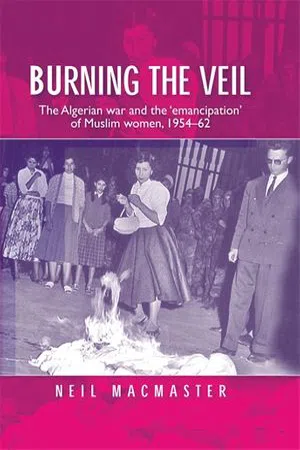
Burning the veil : The Algerian war and the 'emancipation' of Muslim women, 1954–62
- English
- PDF
- Available on iOS & Android
Burning the veil : The Algerian war and the 'emancipation' of Muslim women, 1954–62
About this book
In May 1958, and four years into the Algerian War of Independence, a revolt again appropriated the revolutionary and republican symbolism of the French Revolution by seizing power through a Committee of Public Safety. This book explores why a repressive colonial system that had for over a century maintained the material and intellectual backwardness of Algerian women now turned to an extensive programme of 'emancipation'. After a brief background sketch of the situation of Algerian women during the post-war decade, it discusses the various factors contributed to the emergence of the first significant women's organisations in the main urban centres. It was only after the outbreak of the rebellion in 1954 and the arrival of many hundreds of wives of army officers that the model of female interventionism became dramatically activated. The French military intervention in Algeria during 1954-1962 derived its force from the Orientalist current in European colonialism and also seemed to foreshadow the revival of global Islamophobia after 1979 and the eventual moves to 'liberate' Muslim societies by US-led neo-imperialism in Afghanistan and Iraq. For the women of Bordj Okhriss, as throughout Algeria, the French army represented a dangerous and powerful force associated with mass destruction, brutality and rape. The central contradiction facing the mobile socio-medical teams teams was how to gain the trust of Algerian women and to bring them social progress and emancipation when they themselves were part of an army that had destroyed their villages and driven them into refugee camps.
Frequently asked questions
- Essential is ideal for learners and professionals who enjoy exploring a wide range of subjects. Access the Essential Library with 800,000+ trusted titles and best-sellers across business, personal growth, and the humanities. Includes unlimited reading time and Standard Read Aloud voice.
- Complete: Perfect for advanced learners and researchers needing full, unrestricted access. Unlock 1.4M+ books across hundreds of subjects, including academic and specialized titles. The Complete Plan also includes advanced features like Premium Read Aloud and Research Assistant.
Please note we cannot support devices running on iOS 13 and Android 7 or earlier. Learn more about using the app.
Information
Table of contents
- Front matter
- Dedication
- Contents
- List of illustrations and tables
- Acknowledgements
- List of abbreviations
- Glossary
- Introduction
- From the Sétif Massacre to the November insurrection: the origins of the Algerian women’s movement, 1945–54
- The origins of the emancipation campaign, November 1954 to May 1958
- Unveiling: the ‘revolutionary journées’ of 13 May 1958
- The propaganda offensive and the strategy of contact
- The Mouvement de solidarité féminine: army wives and domesticating the ‘native’
- Military ‘pacification’ and the women of Bordj Okhriss
- The mobile socio-medical teams (EMSI): making contact with peasant society
- The battle over the personal status law of 19591
- The FLN and the role of women during the war
- From women’s radical nationalism to the restoration of patriarchy (1959–62)
- The post-independence state and the conservative marginalisation of women
- Conclusion: the failure of history
- Primary sources and select bibliography
- Index